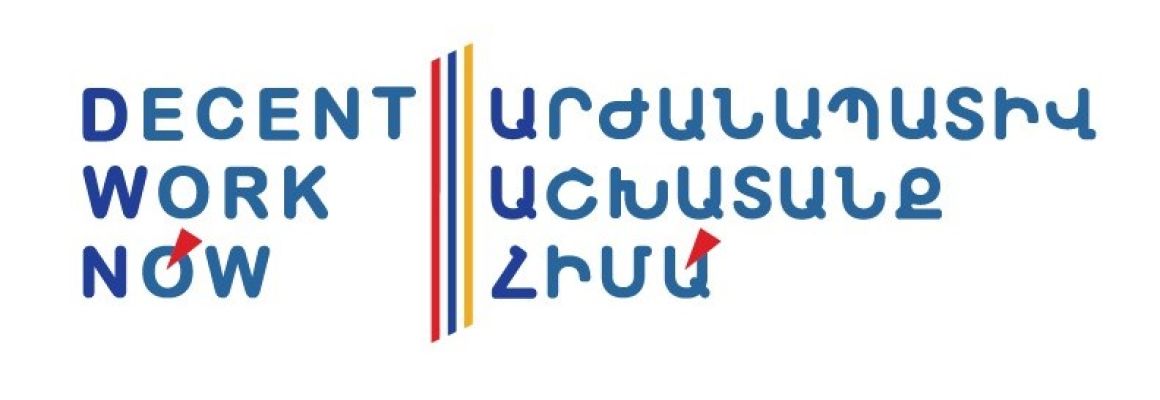Restoring labour rights within the framework of the EU’s “Decent Work Now” project

Promoting labour rights is the cornerstone of building a just and equitable society, where every individual can work with dignity and enjoy the fruits of their labour. Ensuring labour rights significantly affects basic human rights, as many people avoid claiming these fundamental rights because they fear losing their jobs.
The EU-funded “Decent Work Now” project has been in operation since 2021 in Armenia. Its purpose is to contribute developing individual, collective, and state mechanisms for safeguarding labour and social rights and their enforcement in Armenia. The “Decent Work Now” project is being implemented by the Vanadzor Office of the Helsinki Civil Assembly, Transparency International Anti-Corruption Center, “Advanced Public Research Group” NGO, and the “Factor” Information Center, in cooperation with Trade Union Education & Solidarity.
The project focuses on a comprehensive approach to labour rights, emphasizing the empowerment and information of individual citizens and labour unions.
The project concentrates on improving individual citizens’ access to legal assistance, enforcing mechanisms for labour and social rights protection, and strengthening collective protection mechanisms through awareness campaigns and capacity building. It works actively with all stakeholders and notably the Labour Inspection body to include legislative and policy analysis for the reform of state mechanisms related to labour rights and social protection.
Within the framework of the project, a study examining the state of labour rights protection was carried out, and it unveiled that the most common violation is the non-payment of wages.
Within the administrative proceedings initiated by the Health and Labour Inspection Body, the right to fair remuneration of 94 individuals has been restored. Unpaid salaries dating back to 2014 have also been settled, with a total amount of AMD 19,731,643 paid out.
“Legal cases can be time-consuming and require financial and human resources. However, in this case, due to the Inspection Body’s control over salary calculation and payment, the issues were resolved in just a few months. This is one of the examples illustrating the effectiveness of citizen-inspection communication,” says Tiruhi Vardanyan, a lawyer working on the project.
Another significant achievement of the project is the establishment of judicial precedents, particularly cases involving labour law violations due to discrimination. “Currently, we have seven cases in progress, initiated during local government elections, where individuals were dismissed due to political views, and one involving age-based discrimination. Despite legal protection, such cases rarely make it to court,” states lawyer Tiruhi Vardanyan.
“There are courts where no discrimination-based cases have ever been examined. These judicial precedents are crucial not only for demonstrating their effectiveness to people but also for enhancing the court’s knowledge and experience, thereby advancing the judicial system,” explains Artur Sakunts, a human rights defender and the President of the Vanadzor office, Helsinki Civil Assembly
Within the project, 14 court cases were initiated, with 5 successfully concluded, leading to the restoration of employees’ violated labour rights, while 9 are still under investigation. A highly significant instance of successful resolution is the case of Nane Asatryan.
In July 2021, while in the seventh month of pregnancy, Nane Asatryan was terminated from her job. Under the “Decent Work Now” project, the HCAV took up the cause to protect her rights and appealed to the RA Administrative Court, as the rights of working women to maternity protection and labour, guaranteed by international agreements and RA domestic legislation, were violated. The Appellate Administrative Court ruled to reinstate Nane Asatryan to her job and pay her the salary due for the period of non-work, affirming that public servants, as employees, fall within the protection scope defined by Article 24 of the Revised European Social Charter and in each case, when dismissing a person holding a state administrative position, the individual legal act must have factual and legal justification.
Legislative work was also undertaken, with one of the successes of this EU-financed project being the reforms of the Labour Code. According to human rights defender Artur Sakunts, all parties involved in the project participated in all discussions on the law, and all their observations were incorporated into the legislation.
The project’s accomplishments go beyond that. Over the year, 191 individuals received legal assistance in the form of counselling, initiation of court cases, and commencement of administrative proceedings.
Educational and awareness activities are also important. Regional discussions and meetings are regularly organised within the project’s framework. Additionally, all the mentioned successes were consistently covered by the mass media. The project implementers affirm that through this media coverage, citizens become more aware of their rights and learn about effective mechanisms for restoring those rights. In pursuit of this goal, the Factor Information Center prepared and published 34 articles, reports, interviews, and animated videos.
“At present, the state’s efforts towards labour rights are insufficient, so we intend to continue similar projects. Thanks to this project, precedents have been established, which will serve as the basis for long-term work in this field,” concludes Artur Sakunts, the President of the Vanadzor office of the Helsinki Civil Assembly, a human rights defender.
This project is complementary to two other EU-funded projects, “Collaborative Effort for Accountable and Inclusive Employment”, implemented by Union of Employers of Information and Communication Technologies (UEICT) and “Increasing civic voice and action for labour rights and social protection in Armenia: EU4Labour rights”, implemented by Oxygen foundation. In recent years, civil society organisations and media have become more involved in the protection of labour rights by implementing projects and actively raising awareness on the topics.